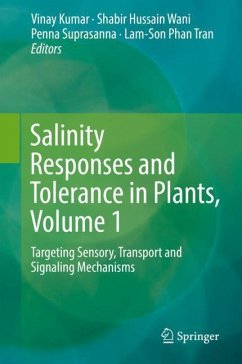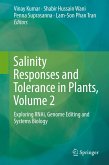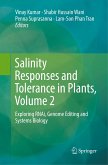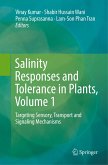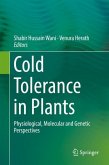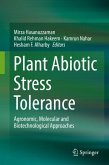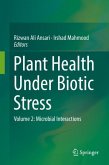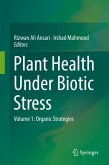Salinity Responses and Tolerance in Plants, Volume 1
Targeting Sensory, Transport and Signaling Mechanisms
Herausgegeben:Kumar, Vinay; Wani, Shabir Hussain; Suprasanna, Penna; Tran, Lam-Son Phan
Salinity Responses and Tolerance in Plants, Volume 1
Targeting Sensory, Transport and Signaling Mechanisms
Herausgegeben:Kumar, Vinay; Wani, Shabir Hussain; Suprasanna, Penna; Tran, Lam-Son Phan
- Gebundenes Buch
- Merkliste
- Auf die Merkliste
- Bewerten Bewerten
- Teilen
- Produkt teilen
- Produkterinnerung
- Produkterinnerung
Soil salinity is a key abiotic-stress and poses serious threats to crop yields and quality of produce. Owing to the underlying complexity, conventional breeding programs have met with limited success. Even genetic engineering approaches, via transferring/overexpressing a single 'direct action gene' per event did not yield optimal results. Nevertheless, the biotechnological advents in last decade coupled with the availability of genomic sequences of major crops and model plants have opened new vistas for understanding salinity-responses and improving salinity tolerance in important glycophytic…mehr
Andere Kunden interessierten sich auch für
![Salinity Responses and Tolerance in Plants, Volume 2 Salinity Responses and Tolerance in Plants, Volume 2]() Salinity Responses and Tolerance in Plants, Volume 277,99 €
Salinity Responses and Tolerance in Plants, Volume 277,99 €![Salinity Responses and Tolerance in Plants, Volume 2 Salinity Responses and Tolerance in Plants, Volume 2]() Salinity Responses and Tolerance in Plants, Volume 277,99 €
Salinity Responses and Tolerance in Plants, Volume 277,99 €![Salinity Responses and Tolerance in Plants, Volume 1 Salinity Responses and Tolerance in Plants, Volume 1]() Salinity Responses and Tolerance in Plants, Volume 177,99 €
Salinity Responses and Tolerance in Plants, Volume 177,99 €![Cold Tolerance in Plants Cold Tolerance in Plants]() Cold Tolerance in Plants116,99 €
Cold Tolerance in Plants116,99 €![Plant Abiotic Stress Tolerance Plant Abiotic Stress Tolerance]() Plant Abiotic Stress Tolerance131,99 €
Plant Abiotic Stress Tolerance131,99 €![Plant Health Under Biotic Stress Plant Health Under Biotic Stress]() Plant Health Under Biotic Stress116,99 €
Plant Health Under Biotic Stress116,99 €![Plant Health Under Biotic Stress Plant Health Under Biotic Stress]() Plant Health Under Biotic Stress116,99 €
Plant Health Under Biotic Stress116,99 €-
-
-
Soil salinity is a key abiotic-stress and poses serious threats to crop yields and quality of produce. Owing to the underlying complexity, conventional breeding programs have met with limited success. Even genetic engineering approaches, via transferring/overexpressing a single 'direct action gene' per event did not yield optimal results. Nevertheless, the biotechnological advents in last decade coupled with the availability of genomic sequences of major crops and model plants have opened new vistas for understanding salinity-responses and improving salinity tolerance in important glycophytic crops. Our goal is to summarize these findings for those who wish to understand and target the molecular mechanisms for producing salt-tolerant and high-yielding crops. Through this 2-volume book series, we critically assess the potential venues for imparting salt stress tolerance to major crops in the post-genomic era. Accordingly, perspectives on improving crop salinity tolerance by targeting the sensory, ion-transport and signaling mechanisms are presented here in volume 1. Volume 2 will focus on the potency of post-genomic era tools that include RNAi, genomic intervention, genome editing and systems biology approaches for producing salt tolerant crops.
Produktdetails
- Produktdetails
- Verlag: Springer / Springer International Publishing / Springer, Berlin
- Artikelnr. des Verlages: 978-3-319-75670-7
- 1st edition 2018
- Seitenzahl: 416
- Erscheinungstermin: 13. April 2018
- Englisch
- Abmessung: 241mm x 160mm x 28mm
- Gewicht: 776g
- ISBN-13: 9783319756707
- ISBN-10: 3319756702
- Artikelnr.: 50634549
- Herstellerkennzeichnung Die Herstellerinformationen sind derzeit nicht verfügbar.
- Verlag: Springer / Springer International Publishing / Springer, Berlin
- Artikelnr. des Verlages: 978-3-319-75670-7
- 1st edition 2018
- Seitenzahl: 416
- Erscheinungstermin: 13. April 2018
- Englisch
- Abmessung: 241mm x 160mm x 28mm
- Gewicht: 776g
- ISBN-13: 9783319756707
- ISBN-10: 3319756702
- Artikelnr.: 50634549
- Herstellerkennzeichnung Die Herstellerinformationen sind derzeit nicht verfügbar.
Dr. Vinay Kumar is an Assistant Professor at the Post-graduate Department of Biotechnology, Progressive Education Society's Modern College of Arts, Science and Commerce, Ganeshkhind, Pune, India and a Visiting Faculty at the Department of Environmental Sciences, Savitribai Phule University, Pune, India. He obtained his Ph.D. in Biotechnology from Savitribai Phule Pune University (Formerly University of Pune) in 2009. For his Ph.D., he worked on metabolic engineering of rice for improved salinity tolerance. He has published 30 peer reviewed research/ review articles and contributed 10 book chapters in edited books published by Springer, CRC Press and Elsevier. He is a recipient of Government of India's Science and Engineering Board, Department of Science and Technology (SERB-DST) Young Scientist Award in 2011. His current research interests include elucidating molecular mechanisms underlying salinity stress responses and tolerance in plants. His research group is engaged in assessing the individual roles and relative importance of sodium and chloride ions under salinity stress in rice and made significant contributions in elucidating the individual and additive effects of sodium and chloride ions. Dr. Shabir H. Wani is an Assistant Professor cum Scientist at the Mountain Research Centre for Field Crops, Khudwani Sher-e-Kashmir University of Agricultural Sciences and Technology of Kashmir, Srinagar, Jammu and Kashmir, India. He has published more than 100 papers/chapters in peer reviewed journals, and books of international and national repute. He is Review Editor of Frontiers in Plant Sciences, Switzerland. He is editor of SKUAST Journal of Research, and LS: An International journal of Life Sciences. He has also edited ten books on current topics in crop improvement published by CRC press, Taylor and Francis Group, USA and Springer. His Ph.D research fetched the first prize in North zone at national level competition in India. He is the fellow of the Linnean Society of London and Society for Plant Research, India. He was awarded with various awards including Young Scientist Award (Agriculture) 2015, Young Scientist Award 2016, Young Achiever award 2016 by various prestigious scientific societies. He has also worked as visiting Scientist in the Department of Plant Soil and Microbial Sciences, Michigan State University, USA for the year 2016-17 under the Raman Post Doctoral Research Fellowship programme sponsored by University Grants Commission, Govt. of India, New Delhi. He is a member of the Crop Science Society of America. Dr. P. Suprasanna (Ph.D. Genetics, Osmania University, Hyderabad) is a Senior Scientist and Head of Plant Stress Physiology & Biotechnology Group in the Nuclear Agriculture & Biotechnology Division, Bhabha Atomic Research Centre, Mumbai, India. Dr. Suprasanna made significant contributions to crop biotechnology research through radiation induced mutagenesis, plant call & tissue culture, genomics and abiotic stress tolerance. His research on radiation-induced mutagenesis and in vitro selection in sugarcane yielded several agronomically superior mutants for sugar, yield and stress tolerance. He has made intensive efforts to apply radiation mutagenesis techniques in vegetatively propagated plants through collaborative research projects. He is actively associated with several national and international bodies (IAEA, Vienna) in the areas of radiation mutagenesis, plant biotechnology and biosafety. He is the recipient of the "Award of Scientific & Technical Excellence" by the Department of Atomic Energy, Govt. of India and is the Fellow, Maharashtra Academy of Sciences, Andhra Pradesh Academy of Sciences, Telangana Academy of Sciences, Fellow, Association of Biotechnology, and Faculty Professor, Homi Bhabha National Institute, DAE. Dr. Suprasanna has published more than 225 research papers/articles in national & international journals and books. His research is centred on molecular understanding of abiotic stress (salinity, drought and arsenic) tolerance, and salt-stress adaptive mechanism in halophytic plants. The research group led by him on crop genomics has successfully identified novel microRNAs, early responsive genes besides validating the concept of redox regulation towards abiotic stress tolerance and plant productivity. Dr. Lam-Son Phan Tran is Head of the Signaling Pathway Research Unit at RIKEN Center for Sustainable Resource Science, Japan. He obtained his M.Sc. in Biotechnology in 1994 and Ph.D. in Biological Sciences in 1997, from Szent Istvan University, Hungary. After doing his postdoctoral research at the National Food Research Institute (1999-2000) and the Nara Institute of Science and Technology of Japan (2001), in October 2001, he joined the Japan International Research Center for Agricultural Sciences to work on the functional analyses of transcription factors and osmosensors in Arabidopsis plants under environmental stresses. In August 2007, he moved to the University of Missouri-Columbia, USA as a Senior Research Scientist to coordinate a research team working to discover soybean genes to be used for genetic engineering of drought-tolerant soybean plants. His current research interests are elucidation of the roles of phytohormones and their interactions in abiotic stress responses, as well as translational genomics of legume crops with the aim to enhance crop productivity under adverse environmental conditions. He has published over 125 peer-reviewed papers with more than 90 research and 35 review articles, contributed 8 book chapters to various book editions published by Springer, Wiley-Blackwell, and American Society of Agronomy, Crop Science Society of America and Soil Science Society of America. He has also edited 11 book volumes, including this one, for Springer and Elsevier.
1. Salinity stress responses and adaptive mechanisms in major glycophytic crops: The story so far BY Sunita Kataria and Sandeep Kumar Verma.- 2. Deploying mechanisms adapted by halophytes to improve salinity tolerance in crop plants: Focus on anatomical features, stomatal attributes and water use efficiency BY Ankanagari Srinivas, Guddimalli Rajasheker, Gandra Jawahar, Punita L. Devineni, Maheshwari Parveda, Somanaboina Anil Kumar and Polavarapu B. Kavi Kishor.- 3. Targeting aquaporins for conferring salinity tolerance in crops BY Kundan Kumar and Ankush Ashok Saddhe.- 4. Strategies to mitigate salt stress effects on photosynthetic apparatus and productivity of crop plants BY Mbarki Sonia, Oksana Sytar, Artemio Cerda, Marek Zivcak, Anshu Rastogi, Xiaolan He, Aziza Zoghlami, Chedly Abdelly, Marian Brestic.- 5. Potassium uptake and homeostasis in plants grown under hostile environmental conditions and its regulation by CBL-interacting protein kinases BY Mohammad Alnayef, JayakumarBose, and Sergey Shabala.- 6. Plant hormones: potent targets for engineering salinity tolerance in plants BY Abdallah Atia, Zouhaier Barhoumi, Ahmed Debez, Safa Hkiri, Chedly Abdelly, Abderrazak Smaoui, Chiraz Chaffei Haouari, Houda Gouia.- 7. Transcription factors based genetic engineering for salinity tolerance in crops BY Parinita Agarwal, Pradeep Agarwal, Divya Gohil.- 8. Targeting the redox regulatory mechanisms for salinity stress tolerance in crop BY Mohsin Tanveer and Sergey Shabala.- 9. Manipulating metabolic pathways for development of salt tolerant crops BY Melike Bor and Filiz Özdemir.- 10. The glyoxalase system: a possible target to produce salinity tolerant crop plants BY Tahsina Sharmin Hoque, David J. Burritt, Mohammad Anwar Hossain.- 11. Cross-protection by oxidative stress: improving tolerance to abiotic stresses including salinity BY Vokkaliga T Harshavardhan, Geetha Govind, Rajesh Kalladan, Nese Sreenivasulu and Chwan-Yang Hong.- 12. Strategies to alleviate salinitystress in plants BY Sara Francisco Costa, Davide Martins, Monika Agacka-Moldoch, Anna Czubacka and Susana Sousa Araújo.- 13. Polyamines and their metabolic engineering for plant salinity stress tolerance BY Tushar Khare, Amrita Srivastav, Samrin Shaikh and Vinay Kumar.- 14. Single versus multi-gene transfer approaches for crop salt tolerance BY Satpal Turan.- 15. Molecular markers and their role in producing salinity tolerant crop plants BY Sagar Satish Datir.
1. Salinity stress responses and adaptive mechanisms in major glycophytic crops: The story so far BY Sunita Kataria and Sandeep Kumar Verma.- 2. Deploying mechanisms adapted by halophytes to improve salinity tolerance in crop plants: Focus on anatomical features, stomatal attributes and water use efficiency BY Ankanagari Srinivas, Guddimalli Rajasheker, Gandra Jawahar, Punita L. Devineni, Maheshwari Parveda, Somanaboina Anil Kumar and Polavarapu B. Kavi Kishor.- 3. Targeting aquaporins for conferring salinity tolerance in crops BY Kundan Kumar and Ankush Ashok Saddhe.- 4. Strategies to mitigate salt stress effects on photosynthetic apparatus and productivity of crop plants BY Mbarki Sonia, Oksana Sytar, Artemio Cerda, Marek Zivcak, Anshu Rastogi, Xiaolan He, Aziza Zoghlami, Chedly Abdelly, Marian Brestic.- 5. Potassium uptake and homeostasis in plants grown under hostile environmental conditions and its regulation by CBL-interacting protein kinases BY Mohammad Alnayef, JayakumarBose, and Sergey Shabala.- 6. Plant hormones: potent targets for engineering salinity tolerance in plants BY Abdallah Atia, Zouhaier Barhoumi, Ahmed Debez, Safa Hkiri, Chedly Abdelly, Abderrazak Smaoui, Chiraz Chaffei Haouari, Houda Gouia.- 7. Transcription factors based genetic engineering for salinity tolerance in crops BY Parinita Agarwal, Pradeep Agarwal, Divya Gohil.- 8. Targeting the redox regulatory mechanisms for salinity stress tolerance in crop BY Mohsin Tanveer and Sergey Shabala.- 9. Manipulating metabolic pathways for development of salt tolerant crops BY Melike Bor and Filiz Özdemir.- 10. The glyoxalase system: a possible target to produce salinity tolerant crop plants BY Tahsina Sharmin Hoque, David J. Burritt, Mohammad Anwar Hossain.- 11. Cross-protection by oxidative stress: improving tolerance to abiotic stresses including salinity BY Vokkaliga T Harshavardhan, Geetha Govind, Rajesh Kalladan, Nese Sreenivasulu and Chwan-Yang Hong.- 12. Strategies to alleviate salinitystress in plants BY Sara Francisco Costa, Davide Martins, Monika Agacka-Moldoch, Anna Czubacka and Susana Sousa Araújo.- 13. Polyamines and their metabolic engineering for plant salinity stress tolerance BY Tushar Khare, Amrita Srivastav, Samrin Shaikh and Vinay Kumar.- 14. Single versus multi-gene transfer approaches for crop salt tolerance BY Satpal Turan.- 15. Molecular markers and their role in producing salinity tolerant crop plants BY Sagar Satish Datir.

